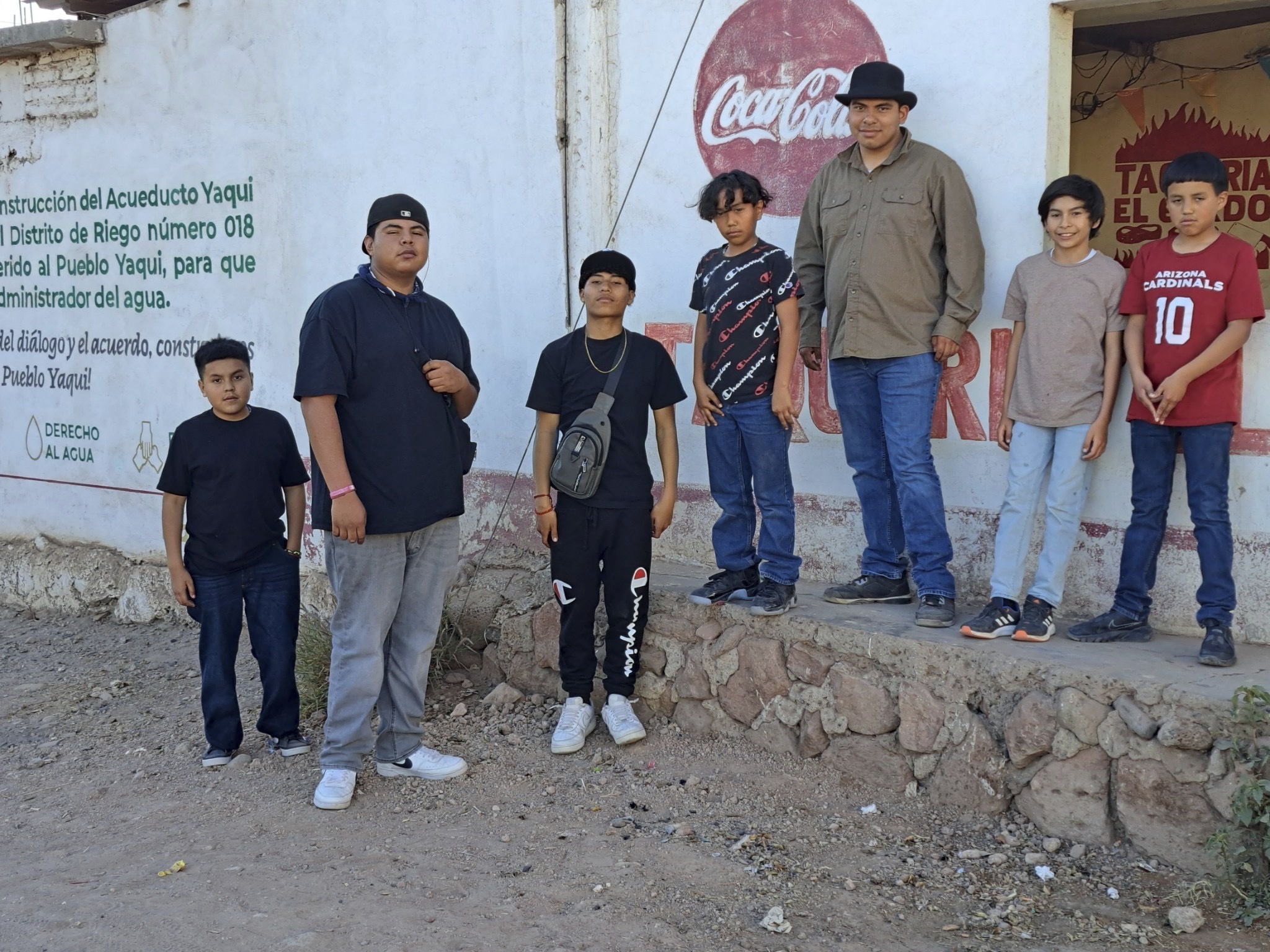‘Why can’t there be a system?’: Tribe pushes to ease US border crossings for Native Americans
May 12, 2023, 10:12 PM

Members of the Pascua Yaqui Tribe pose for a photo in their tribal community in Sonora, Mexico. in March, 2023. (Raymond V. Buelna via AP)
Credit: ASSOCIATED PRESS
(Raymond V. Buelna via AP)
For four hours, Raymond V. Buelna, a cultural leader for the Pascua Yaqui Tribe, sat on a metal bench in a concrete holding space at the U.S.-Mexico border, separated from the two people he was taking to an Easter ceremony on tribal land in Arizona and wondering when they might be released.
It was February 2022 and Buelna, a U.S. citizen, was driving the pair — both from the sovereign Native American nation’s related tribal community in northwestern Mexico — from their home to the reservation southwest of Tucson. They’d been authorized by U.S. officials to cross the border. But when Buelna asked an agent why they were detained, he was told to wait for the officer who brought him in.
“They know that we’re coming,” said Buelna, who has made the trip for a variety of ceremonies for 20 years. “We did all this work and then we’re still sitting there.”
Now, the Pascua Yaqui Tribe is trying to change this — for themselves and potentially dozens of other tribes in the U.S.
Tribal officials have drafted regulations to formalize the border-crossing process, working with the U.S. Department of Homeland Security’s recently formed Tribal Homeland Security Advisory Council, comprised of 15 Native officials across the U.S.
Their work could provide a template for dozens of Native American nations whose homelands, like the Pascua Yaqui’s, were sliced in two by modern-day U.S. borders.
If approved, the rules would become the first clearly established U.S. border crossing procedures specific to a Native American tribe that could then be used by others, according to Christina Leza, associate professor of anthropology at Colorado College.
The regulations would last five years, to be renewed and amended as needed, and require training local U.S. Customs and Border Protection agents and consular personnel on the tribe’s cultural heritage, language and traditions. It would require a Yaqui interpreter to be available when needed. It also would require close coordination with the tribe so border crossings are prompt.
“This is just something that will help everybody,” said Fred Urbina, attorney general for the Pascua Yaqui Tribe. “It will make things more efficient.”
Urbina said the tribe has met with Homeland Security Secretary Alejandro Mayorkas about the proposal. DHS did not immediately respond to repeated requests for comment by phone and email on the status of the regulations.
When family members, deer dancers or musicians living in Sonora, Mexico, make the trip into the U.S. for ceremonies, tribal recognition celebrations or family events, they are typically issued an ID card from the tribe and a visitor visa or parole permit from the U.S. government. Still, they still face border officials who they say lack the cultural awareness to process them without problems.
In the last two years, Buelna said, he has made the roundtrip about 18 times and was detained on four of them. He said border officials question the people he’s escorting, whose first language is Yaqui, without an interpreter, and cultural objects, such as deer and pig hooves, have been confiscated. Officials have touched ceremonial objects, despite only certain people being permitted by the tribe to do so.
Urbina explained that the tribe encountered new challenges when Homeland Security was formed after 9/11 and border security was heightened. It became more pronounced in 2020, when the U.S. prohibited new restrictions are in place.
As a sovereignty issue, Native American nations should be able to determine their people’s ability to cross the border to preserve the ceremonial life of their communities, Leza said.
“If the federal government is saying our particular priorities, our interests in terms of securing our borders, trump your interests as a sovereign nation, then that’s not really a recognition of the sovereignty of those tribal nations,” she said.
Tribes along the U.S.-Canada border face similar problems.
The Sault Ste. Marie Tribe of Chippewa Indians is headquartered in Michigan, but 173 of its more than 49,000 enrolled members live in Canada. Kimberly Hampton, the tribe’s officer-secretary and vice chair of the Tribal Homeland Security Advisory Council, said those members cross the border for powwows, fasting and to visit with traditional healers and family, but border officials have rudely rifled through eagle feathers and other cultural objects they are carrying.
Hampton wants an agreement that includes having tribal liaisons at border crossings and training developed by the tribe for border personnel.
Members of the Sault Ste. Marie tribe and the Saint Regis Mohawk Tribe, which has about 8,000 members in the U.S. and about 8,000 in Canada, said they have also been asked at the border to prove that they possess at least 50% “blood of the American Indian race.” It stems from a requirement under the 1952 Immigration and Nationality Act that “American Indians” born in Canada cannot be denied entry into the U.S. if they can prove this — often through a letter from the tribe.
Saint Regis Mohawk Tribe Chief Michael L. Conners wants to eliminate the requirement and boost education for border agents on local and national tribal issues. Drafting regulations specific to the tribe, like the ones the Pascua Yaqui are doing, “would bring a lot of peace of mind to our whole community,” he said.
For Buelna, waiting in that concrete holding space, he was reunited with the pair only after he told a border official he thought they’d been overlooked following a shift change, he said.
“Why can’t there be a system?” Buelna asked. “Why can’t there be already a line for us where we can present the proper paperwork, everything that we need and go about our way?”







